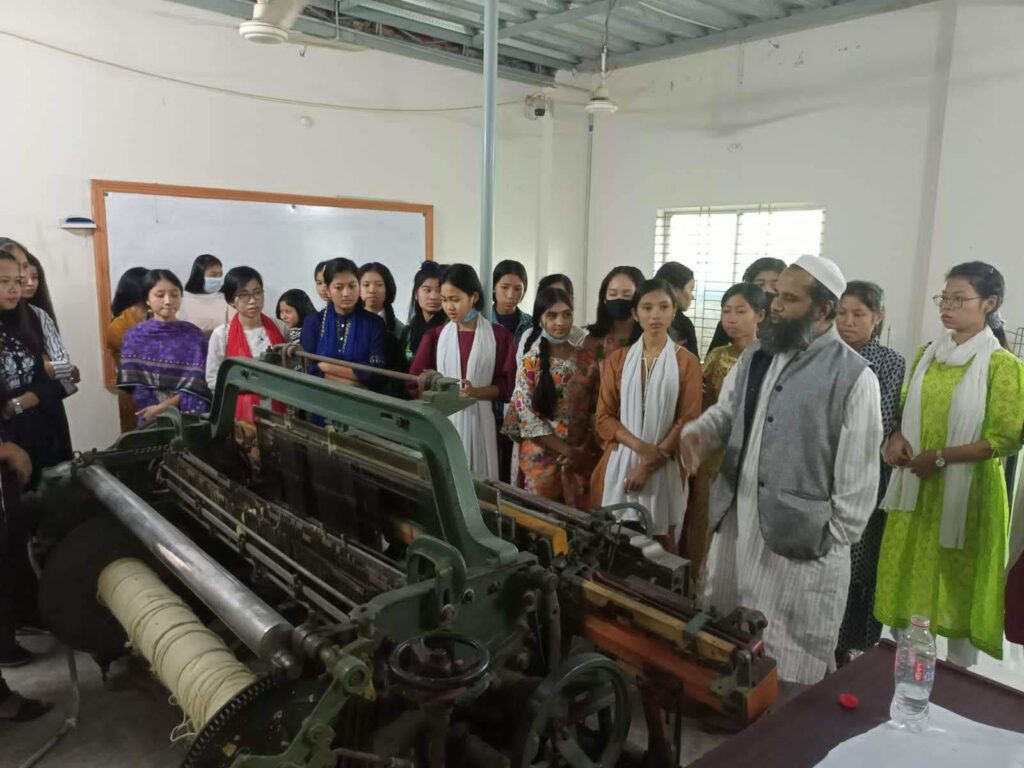Textile Engineering
Introduction
Textile Engineering is a vital field that merges principles of engineering and technology to design and manage the processes that create textile products. From fiber production to the creation of fabrics and garments, Textile Engineering plays a crucial role in one of the world’s largest industries. This article explores the significance and scope of Textile Engineering, highlighting the opportunities it offers for students at the National Polytechnic Institute Manikganj.
The Essence of Textile Engineering
Textile Engineering encompasses various aspects of textile production and processing, each critical in ensuring the quality, efficiency, and innovation of textile products. At the National Polytechnic Institute Manikganj, students gain comprehensive knowledge and skills in the following areas:

1. Fiber Science : This field involves the study of natural and synthetic fibers used in textile production. Students at the National Polytechnic Institute Manikganj learn about the properties, production methods, and applications of different fibers.
2. Yarn Manufacturing : This area focuses on the processes involved in converting fibers into yarns. The National Polytechnic Institute Manikganj provides training on spinning technologies, yarn quality control, and the mechanical properties of yarns.
3. Fabric Manufacturing : Fabric manufacturing encompasses weaving, knitting, and non-woven fabric production. Students at the National Polytechnic Institute Manikganj gain hands-on experience with various fabric construction techniques and machinery.
4. Textile Chemistry and Finishing : This field deals with the chemical processes used to enhance the properties of textiles, such as dyeing, printing, and finishing. The National Polytechnic Institute Manikganj offers courses on textile chemistry, color science, and finishing techniques.
5. Garment Manufacturing : Garment manufacturing involves the design, cutting, and assembly of fabrics into finished clothing. Students at the National Polytechnic Institute Manikganj are trained in pattern making, sewing technologies, and quality assurance.
Textile Course Outline
SEMESTER-1
- 1911 Textile Raw Material 1
1912 General textile Process-1
5911 Mathematics-1
5913 Chemistry
5711 Bangla
7011 Basic Workshop Practice
5812 Physical Education
SEMESTER-2
- 5712 English 2
5812 Physical Education
5912 Physics-1
5921 Mathematics-2
6621 Computer Application-1
5711 Bangla
6821 Electronic Device & Circuit-1
7011 Basic Workshop Practice
- 5712 English 2
SEMESTER-3
- 1931 Yarn Manufacturing-1
1932 Fabric Manufacturing-1
6621 Computer Application-1
5931 Mathematics-3
5922 Physics-2
5821 Social Science-2
5722 English-2
- 1931 Yarn Manufacturing-1
SEMESTER-4
1941 Yarn Manufacturing 2
1942 Fabric Manufacturing-2
1943 Wet Processing-1
1944 Textile Testing & Quality Control-1
6632 Computer Application-2
7142 Engineering Mechanics
1449 Statistic
5840 Environmental Management
SEMESTER-5
1951 Yarn Manufacturing-3
1952 Fabric Manufacturing-3
1953 Wet Processing-2
1954 Clothing-1
1955 Textile Testing & Quality Control-2
1956 Fabric Structure & Analsis-1
5851 Book Keeping & Accounting
SEMESTER-6
- 1961 Wet Processing-3
5062 Clothing-2
1963 Textile Testing & Quality Control-3
1964 Textile Calculation-1
1965 Fabric Structure & Analysis-1
5840 Environmental Managementt
5841 Business Org. & Communication
SEMESTER-7
- 1971 Textile Design & color
1972 Advanced Short Staple Spinning
19763 Long Staple Spinning
1980 Maintenance of Yarn Manufacturingl
1984 Textile Calculation-2
5064 Production Planning & Control
5853 Entrepreneurship
Diploma In Electrical Engineering Fees
| Admission Fee | Tution Fee (Per Month) | Semester Fee (Per Semester) | Total Fee |
|---|---|---|---|
| BDT. 5,000 | BDT. 2,000 | BDT. 11,000 | 1,20,000 |
